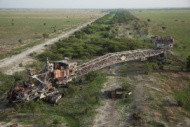South Sudan resumes Jonglei Canal project

excavator on Jonglei Canal project
Lucy's mechanical arms rust on a highway of mud, the bed of a canal that was never built now invaded the swamp. It's been 28 years after the ambush led by the Sudan People's Liberation Army and the Nile waters continue to be at once a source of hope for peace and conflict.
'Lucy' is one of the excavators burned on November 13, 1983, in what historians describe as the beginning of the civil war between the rebels and the army of the south of Khartoum. Today, the metal hooks dangling in the void hundreds of kilometres away from the river: The Jonglei Canal, which was to bring every year, five billion cubic metres of water to camps in northern Sudan and Egypt, was left unfinished.
"Peace and war depend also from this channel," says Professor Wassara Samson, dean of the Faculty of Economic and Social Studies at the University of Juba and author of a study this year entitled "South Sudan and the division of resources of the Nile." His thesis is that the challenge over water will define future relations between Sudan and South Sudan, which became independent on July 9 after a 22-year long civil war. "As for bilateral relations - says Wassara - there are several problems: the first is the division of oil revenues, as Khartoum is ready to occupy the border region of Abyei in order to obtain favorable terms and the second is water."
Tensions between North and South Sudan, on the other hand, are amplified by the mistrust that mark the relations between states of the Nile Basin. On the basis of a treaty of the colonial era, signed for the first time in 1929 and updated in 1959, Egypt and Sudan would be entitled to 73 of the 84 billion cubic meters of water annually transported from the Nile. Put another way, only two of the 11 river countries have exclusive use of 86% of the Nile's water.
The tensions between the countries of the upper and lower Nile course began immediately after the independence of the '60s, as the new governments of Tanzania, Kenya and Uganda at led denunciations of the iniquities of the agreements imposed by the British colonizers. This period was symbolized by the Nyerere document, a "J'accuse" in which the President of Tanzania challenged the Egypt and Sudan's veto over the construction of dams and irrigation projects that lower the level of the Nile. "At stake - Nyerere wrote - is the development of peoples."
Source: UCAN















